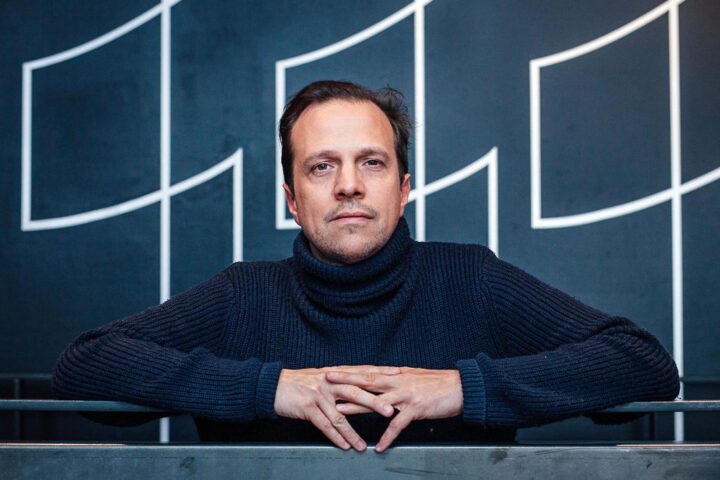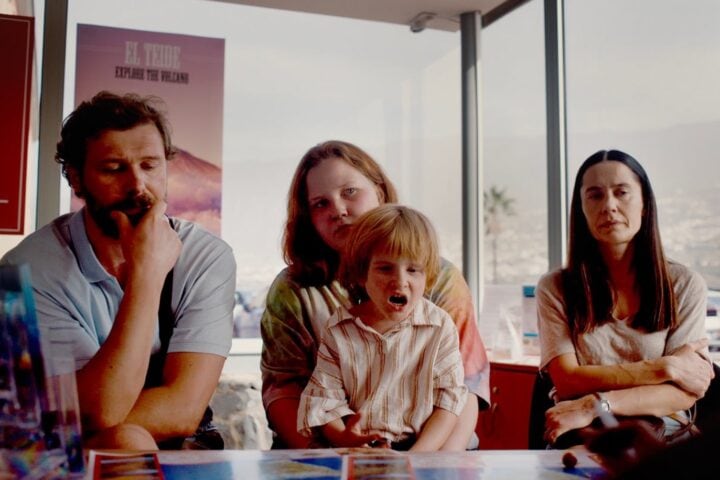Philippe Lesage’s Who by Fire begins with a vision of what could be called stasis in motion. Following a car on a highway as it winds its way deeper into the woods, the opening shot holds for an unnervingly long time, accompanied by droning ambient music, before moving into the car, where the legs and hands of two people sitting side by side can be glimpsed. Only later will it be made clear that the occupants of the car are screenwriter Albert (Paul Ahmarani), his two kids, Aliocha (Aurelia Arandi-Longpré) and Max (Antoine Marchand-Gagnon), and Max’s friend Jeff (Noah Parker), on their way to the cabin of Albert’s former collaborator, Blake (Arieh Worthalter), that’s only accessible by seaplane.
The portentousness of this early journey is laced with a somewhat spiky sense of humor; in one scene, captured in a single long shot, Albert teasingly drives forward several times, preventing Aliocha from getting back into the car. It all sets the tone for what slowly reveals itself to be a tremendously unpredictable, protean work, drawing its energy from the disparities between individuals and how they can unexpectedly develop and feed upon each other.
It all stems from the resentment between Albert and Blake: After a series of acclaimed films, the latter decided that he wanted to move away from fiction and toward making documentaries for a much smaller audience, leaving his scriptwriter in the lurch. This is the first time that they’ve seen each other in years, and before they’ve even opened one of Albert’s prized wines, the two men are already playfully roughhousing and trading barbs.
Each relationship in the film feels infected by more than a hint of rivalry, such as the unexpected bond that’s forged and broken between Jeff and Blake. Jeff was invited to the cabin because of his interest in filmmaking and admiration of Blake, though his eye quickly wanders toward Aliocha, who also harbors conflicted feelings toward the veteran filmmaker and her father. The near-excess of character relationships to keep track of includes various associates of Blake’s, including his editor (Sophie Desmarais), his staff (Guillaume Laurin and Carlo Harrietha), and an actress, Hélène (Irène Jacob), and her partner (Laurent Lucas) who’ve traveled all the way from Paris to spend time with their friend in his patch of the Canadian wilderness.
More than anything, Who by Fire is a film of great freedom, using its 161-minute runtime to act as a container for a profusion of scenarios, continually deepening the tensions between characters that slowly develop while maintaining an outwardly convivial, even exuberant atmosphere. The sense of play extends to characters literally bursting into song, including a rollicking (and hilariously plot-relevant) group dance to the B-52s’s “Rock Lobster,” but is typically expressed by Lesage’s facility with camera movement. A few scenes set around the dining table are incredibly expressive, as in one long take where the camera drifts over the table into seemingly impossible positions. The effect of this and many other sequences is the suggestion that anything can happen at any given moment, even violence.
Correspondingly, one of Who by Fire’s greatest assets is Lesage’s willingness to shift the tenor of the film to fit the wildly divergent narrative concerns of any given sequence. One stretch in the first half follows Jeff as he gets lost in the woods at night and quickly has to find shelter, and Who by Fire suddenly resembles a survival thriller more than, say, a coming-of-age drama, embracing the visual possibilities offered by the hazy twilight.
That tonal fluidity even applies to setting—it’s unclear when the film takes place—and point of identification. Jeff eventually emerges as the main character, but Parker’s unassured presence is outmatched by Ahmarani and Worthalter’s gregarious extroversion, and, like the film itself, it gives the sense of a protagonist who’s defined by his lack of definition, and as such capable of anything. What is certain, after all the joy and anguish felt at certain moments, is a central irresoluteness. After all the sparks, the fire still burns, even if it’s only a few smoldering embers.
Since 2001, we've brought you uncompromising, candid takes on the world of film, music, television, video games, theater, and more. Independently owned and operated publications like Slant have been hit hard in recent years, but we’re committed to keeping our content free and accessible—meaning no paywalls or fees.
If you like what we do, please consider subscribing to our Patreon or making a donation.



